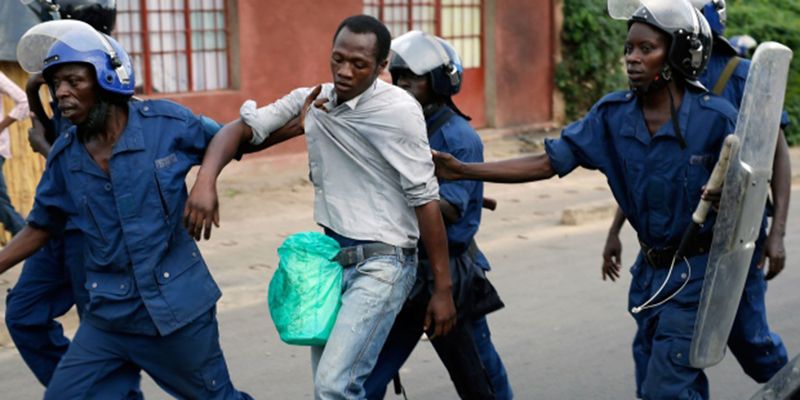

The people of Burungi during demonstrations against President Pierre Nkurunziza’s agitation for a their term
The ruling party of the tiny, Great Lakes nation of Burundi has made arguably the most momentous decision in the young country’s history by fielding the current President Pierre Nkurunziza as their candidate for the June Presidential elections.
Despite an apparent constitutional limit of two five-year terms, current President Nkurunziza whose last term has expired is angling for a third term. The current opposition protests and the unrest in the country stem from the fact that president Nkurunziza’s candidature come June has been approved by court. However, this is not news in African politics.
About two decades ago the phrase term-limits appeared on the African continent and become a ray of hope to all those who believed in the periodic change of presidency. It was hoped that the introduction of new constitutions with a two-term limit on power would bring the ‘big man’ syndrome of African politics to history.
Despite the new political strategy, the attraction of power remains a strong motivating factor for many leaders. This is further exhibited by the usual attempts by some heads of state to extend their tenure beyond the constitutionally permitted number of terms, or maintain power via a back-door strategy of hand-picking a docile successor and remaining in the powerful post of the chairman of the country’s dominant political party.
Term limits are a common feature of democratic constitutions adopted in Africa. Term limits offer a periodic guarantee of personal change and thus enhance the possibility of change of party in government. This is significant, as power alteration is an important feature of a democratic polity. It is viewed as a golden solution that can end military options as means of changing government.
Advocates for term limits hoped that the system would prevent arbitrary and violent rule often associated with lifelong presidencies from recurring. It was also seen as the best system to ensure rotation of power among parties, ethnic groups, religions and other societal groupings. In Nigeria for instance, term limits were expected to contribute to the zonal rotation of the presidency among the country’s three main geo-ethnic-political zones, thus alleviating the danger of one of the groups feeling permanently politically marginalized.
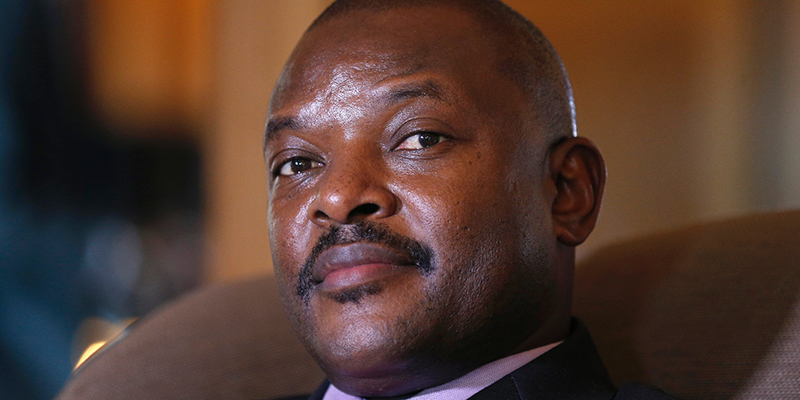
President Pierre Nkurunziza
Though a number of presidents have successfully handed over power and retired from the Presidency, many others have managed to lift term limits and extend their tenures in office. Most of them long-serving leaders In Africa today secured constitutional amendments that allowed them to stand for a third term and more subsequent terms in office.
The likes of Blaise Compaore of Burkina Faso, Idriss Deby of Chad, Omar Bongo of Gabon, Lansana Conte of Guinea, Sam Nujoma of Namibia, Gnassingbe Eyadema of Togo and Yoweri Museveni of Uganda make successful attempts to lift term limits.
Since 1990, 11 countries in sub-Saharan Africa have had leaders try to rewrite their constitutions to do away with term limits. Seven (64 percent) of these leaders succeeded. These countries include Burkina Faso, Chad, Gabon, Guinea, Namibia, Togo, and Uganda. More leaders are around the corner warming up and threatening to change their constitutions and have limits scrapped so that they can stay longer on the political saddle. As more and more leaders join this club time will render the term limit phenomenon a mere scare crow that does not bar leaders from enjoying the grains in the field.
In Malawi Bakili Muluzi unsuccessfully campaigned for a constitutional amendment to allow him run for a third term. A parliamentary bill to that effect was narrowly defeated. Subsequently, Muluzi attempted to put another two bills before the parliament. However, these met with a rising opposition and were withdrawn.
This was almost the same case in Nigeria when supporters of President Obasanjo attempted to push through a constitutional amendment that would allow him to serve for a third term. Accordingly this met with a strong backlash from the media, the public, the international community, and even Obasanjo’s own party, the People’s Democratic Party (PDP). The amendment was voted down in the Nigerian Senate.
While some leaders found it easy to prolong their stay in power, in other countries the constitution proved to be a powerful reference point that constrained the leader’s behaviour. It is important to note that there are determinants that account for the varying outcomes of third-term amendment struggles. These include factors within society such as the level of popular dissatisfaction with the leader, the strength of civil society and the level of media independence.
Other factors included the ability of the incumbent to suppress opposition, the size of parliamentary majority of the ruling party, factors affecting the coherence of the ruling party and international pressure. We cannot also undermine the factors affecting the leader personally which had a direct hinge on the possibility of impunity, opportunities for retired presidents and the dedication to constitutionalism.

Police in Burundi arrests a man during a demonstration against President Pierre Nkurunziza’s agitation for a their term






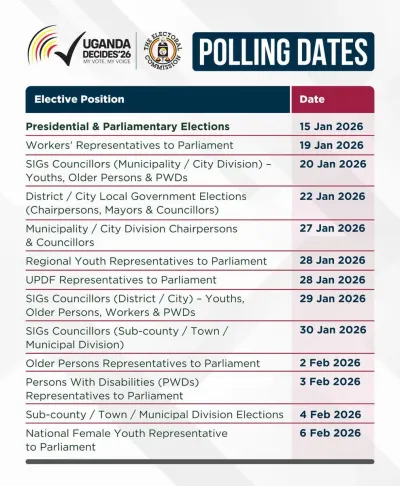



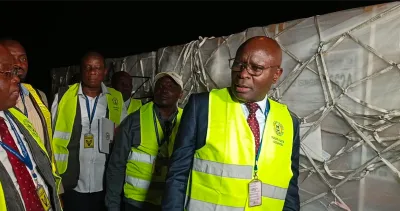


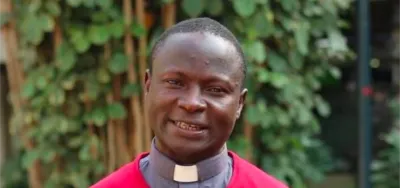
Isa Senkumba
Isa Senkumba is a social critic
Leave a Comment
Your email address will not be published.